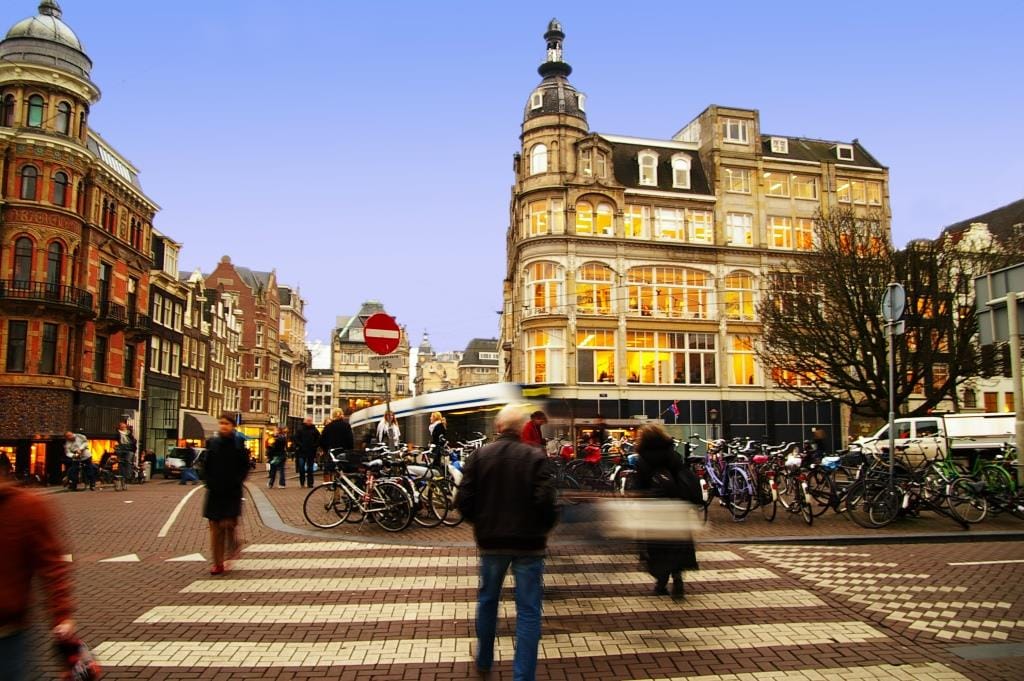Energy Renovations Benefit Communities, not Speculators
BRIEFING NOTE 3/2017:
Over 1.8m refurbished households in Europe received an average €724 a year cut in their energy bills over the first half of this decade, but more impressive is the growing body of evidence that their communities blossomed as a result. Around half a million jobs have been created by the €33bn of EU monies spent on social housing programme in areas of high social deprivation - that's 15 jobs for every €1m invested. But the renovation projects have also left a legacy of friendlier communities and improvements to the quality of life...
Learn more about the event Funding for Energy Renovation as a Stimulus for Urban Regeneration organized by Renovate Europe and the URBAN Intergroup.
Read other Renovate Europe Briefings
REDay2017 Posters in Brussels Metro
Have you seen the #REDay posters in the Brussels Metro?
Take a photo and tweets them!
Op-ed: Paris Agreement under threat as member states water down building performance measures (Euractiv)
Published by Euractiv on: 20 June 2017 | While President Trump is grabbing world headlines by publicly trashing the Paris climate agreement, EU member states are also trying to sabotage this deal by watering down measures in the Energy Performance of Buildings Directive (EPBD) and Energy Efficiency Directive (EED), writes Adrian Joyce.
Interview with MEP Bendt Bendtsen

MEP Bendt Bendtsen is Rapporteur for the Draft Report on the Revision of the Energy Performance of Buildings Directive.
Renovate Europe spoke to Bendt Bendtsen on 10 May 2017 in the European Parliament.
Is there a broad consensus in Parliament on the EPBD? Do you see many problems in getting your proposals through?
Bendt Bendtsen:
Generally speaking, there seems to be a broad agreement that buildings must contribute more to decarbonisation efforts than they do today. That being said, of course we have different priorities and ideas in the Parliament on how to get there - and I must do what I can to get everyone on board. I really believe that the EPBD can deliver and it shall deliver. It will be good for Europeans and for European companies and if EPBD delivers some tangible savings, Europe's energy intensive companies, all the ETS companies, will benefit directly. There are many benefits to reap.
I see an EPBD that creates growth, innovation, jobs and at the same time we will solve a lot of problems caused by rising demand for imported fossil fuels from Putin and also of oil from the Middle East. It is a question of security of supply and sustainability. I would not mind saving some of the billions of Euros that we spend on importing energy to Europe every year - by saving energy in our buildings’ consumption and by using the energy smarter.
I see so many advantages to this file that it is obvious for me that we must get a strong and ambitious directive in the end. However, to get there, we first need a strong position in the Parliament, so that we can face the Council, who seem mainly to be interested in watering the proposal down. It will become difficult to get a good result if these members of Council do not change their minds.
What will be the result – for Europe - if the Members of the Council are successful in watering down the EPBD?
Bendt Bendtsen:
For the Parliament, our ambition is that we further commit Member States to take actions to deliver the needed results and improvements of the building stock. When working with the Energy Efficiency Directive in 2010, we already came a long way - but much more is needed.
Since new buildings are only 1-1.5% of the total building mass, most of the buildings we will have in 2050 are here now, and many of them are inefficient. Therefore, we really need to drive forward the renovation of buildings.
As I see it, the Ministers in the Council will miss a huge opportunity to create jobs, especially in our SMEs in Europe, they will miss an opportunity to make European homes and offices healthier and they will continue pouring our money in the hands of Russians in exchange for imported fossil fuels. It will make Europe vulnerable, dependent on others and the energy bills much higher than needed for European consumers. They will of course also disregard the climate targets set by the Heads of State and Government.
Member States signed up to the Paris climate agreement -why do you think they are baulking at the measures that would allow them to achieve these?
Bendt Bendtsen:
Because now it is in the hands of the energy ministers. Take the Energy Union – we would not have had an Energy Union flagship project with clear targets if it had been up to the energy ministers to decide.
Do you think the energy ministers believe there are more cost-effective ways of cutting emissions than energy efficiency?
Bendt Bendtsen:
We know that saving one kW comes at roughly one fourth of the price of buying one kW - so clearly it pays off. However, I acknowledge that there is a concern, also with the ministers, that energy savings and increased energy efficiency can only be achieved by less production in Europe, but I do not agree. As a Dane, I can testify to energy efficiency measures resulting in more production, more jobs and lower energy consumption. Denmark has doubled its GDP without using more energy.
I know that conditions are diverse across Europe, and this is why we do not dictate the actions that Member States must take - but we do expect them to deliver measurable results on the indicated parameters.
However, to do it cost-effectively, naturally our buildings should contribute more - as there is a huge potential - rather than forcing more expensive savings measures on other sectors. Our major problem with the EPBD is the need to crack the nut of financing.
We know that many private actors are looking to invest these days, but they need a stable framework and security of investment, so we need to provide a strong political signal that we prioritize a better building stock.
It is excellent that we have public money, also at European level, for example by the European Investment Bank, the European Fund for Strategic Investments and the Structural Funds. It is a good tool to have to gear private financing for renovations and should be used to take off the top of the risk for investors with public money. Because public money alone does not solve the challenges. We really need private money out working and in the draft of the EPBD, I have committed Member States to do more in their long-term renovation strategies - of course with respect for the principle of subsidiarity. But to achieve the targets, I really need more commitment from the Member States to the long-term renovation strategies, including milestones indicating the progress made.
Why are the milestones so important?
Bendt Bendtsen:
The core value of milestones for 2030 and 2040 is to ensure that the Member States deliver as agreed and to monitor that everyone are well on track to meet the 2050 target. That is why we need those clear milestones. They also give a chance to Member States to correct national policies that may not be working as intended and to share experiences on the actions taken to reach the milestones.
Do you think that the EU could set a yearly buildings emissions reductions target in line with the Paris Agreement?
Bendt Bendtsen:
I think you can tackle this in different ways, and I will not at this moment lock myself to one option over another. I have to listen to the political majority and find the best and broadest agreements. I believe we have to start with the fundamentals of boosting renovations, big and small, to provide the European energy consumers the building stock they deserve - and the corresponding health benefits and lower energy bills.
END
Renovate Europe Newsletter 2/2017
The Renovate Europe Newsletter is out!
Read all the news: http://mailchi.mp/renovate-europe/renovate-europe-newsletter-june?e=5bc703176d
Can we finance a Renaissance in Energy Renovations?
18 May 2017 by Adrian Joyce, Renovate Europe Campaign Director

A renaissance in building renovations is urgently needed by our industry, our energy poor and the planet but how we reach it can feel like a riddle wrapped in an enigma. Governments, banks and homeowners all have a role to play in solving it, but too often they - inadvertently - add to the mystery.
Banks say that demand is just not there. Tenants ask why they should fund someone else's home improvement, while landlords demand subsidies for remedial work. Government shuffle obligations onto the backburner. Meanwhile, the fuel poor wonder how they will ever afford the upfront cost of a renovation, when they're behind on their other bills?
In practice, the brunt of renovation efforts is usually born by local and national housing departments, and by homeowners who are most likely to act when refurbishment is cheaper and at ‘trigger points’ when refurbishment is less disruptive. Such times include the buying, selling or renting of properties, or when building of extensions.
For housing authorities, the single biggest funding source is the EU, which has made €18bn of structural funds available for energy efficiency improvements until 2020. A recent report by the EU's joint research center urged the introduction of an EU-wide renovation plan to transform a sectoral market failure, as it sees it, into one key pillar of “the renaissance of EU industry”.
The commission already has a smart finance for smart buildings programme that it says can unlock €10bn of public and private funds by 2020. But an estimated €4.25 trillion is needed above business as usual investments, if the EU is to decarbonize its building stock by 2050. Existing pledges will not take us far above the current 1% rate of renovations a year.
'On-bill financing' or state-backed loans that pay renovation costs against future energy bill savings are one innovative idea backed by the JRC. This has been used to great effect by Energiesprong in the Netherlands, and it's being emulated in France by Transition Zero. The Dutch government has also offered a tax break to support green investment and put up €400m to subsidise renovations in the rented sector.
In the Czech Republic too, a Green Savings scheme has invested around a billion euros of carbon allowances to reduce buildings emissions, benefitting 5-7,000 people a year. Under Estonia's Kredex Fund, in just four years, nearly 100,000 people scooped up €96m of state-backed loan guarantees and grants cutting up to 85% of their reconstruction costs. Europe's pace setter though remains Germany's KfW bank, which has an annual spend of €1.8bn. Investment grants for KfW's 'efficiency houses' can cover as much as €18,750 of costs.
Private sector banks are also expanding their green mortgage portfolios, with one eye on the boost that renovations give to property prices and another on the buy-to-renovate boom in the US housing market. The European Mortgage Federation is increasing the profile of green mortgages, and so are its members.
Triodos in the Netherlands winds down its interest rate on loans by 0.1% for every grade increase in a property's energy performance. Rabobank, also in the Netherlands, offers a 0.5% reduction in interest rates over a 10-year period for NZEB houses. ING Belgium offers renovation loans of up to €50,000 this year, with a 1.95% interest rate for up to a decade. KBC Brussels is moving in a similar direction.
It's an impressive start, but a lack of customer awareness mixed with austerity-hit demand is still obstructing the green mortgage expansion and here, governments can make a real difference.
This year's crop of national renovation plans could pull up the worst-performers in Europe's housing stock by introducing renovation requirements at key trigger points in a building's life. Equally, targeted public spending and the increased use of cohesion and structural funds could reduce risk perceptions and lower the cost of upfront investments. Awareness campaigns could stimulate market demand, especially when combined with innovative financing models.
Rome was not built in a day and Europe's housing stock will not be renovated overnight either. But better financing can at least put solid foundations in place for the overhaul we need to move our housing stock into the 21st Century.
END
Download the Renovate Europe Briefing 2/2017 on Energy Renovation - Making Financing Accessible to the People
Read the letter that was sent to the 28 Ministers ahead of the Informal Energy Ministerial on 18-19 May









